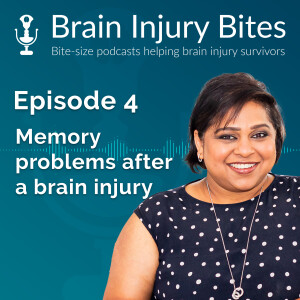
In this episode of Brain Injury Bites, Brooke Trotter and Ashwini Kamath discuss how memory is impacted after a brain injury and practical ways to adapt when everyday tasks become more challenging to remember.
Together, they reflect on Brooke’s personal experiences, including forgetting where he parked, running a bath that nearly flooded the house, and forgetting basic shopping items. They also talk about the emotional impact of memory issues and how fatigue, anxiety, and the environment can make things worse.
They explore:
- The difference between retrograde and anterograde amnesia
- Brooke’s real-life memory mishaps and the strategies he uses now
- How phones, alarms, and apps can support daily life
- Low-tech memory tools like notebooks, whiteboards and post-its
- The connection between memory, identity, and independence
- Tips for creating a routine and using assistive technology with confidence
This episode is packed with useful strategies and light-hearted honesty about what it’s really like living with a brain injury. Whether you’re recovering yourself or supporting someone who is, there’s something here to help.
Chapter Markers:
00:00 - Introduction to Memory and Why It Matters
01:56 - Different Types of Memory Loss After Brain Injury
03:13 - Real-life Memory Challenges: Losing the Car
06:58 - Phones, Notebooks and Everyday Memory Tools
09:00 - Memory Mistakes at Home: Baths and Burnouts
15:04 - Tips and Advice for Managing Memory Day to Day
Resources:
Helpful links:
- Different types of memory problems after a brain injury
- To do lists/organisational skills - https://todoist.com/
- Weekly Schedule - Download
For a transcript, follow the link below:
To keep up to date with our podcast, follow us on our social media accounts:
Community Compass app!
Brain Injury Bites is now part of the Community Compass app! Download now and take the first step toward reclaiming your best life - because you’re not alone in this journey.
Notice:
Information and other content provided in this Podcast should not be taken as providing medical advice or recommendations. Please always consult your doctor or treating team for medical advice.
No comments yet. Be the first to say something!